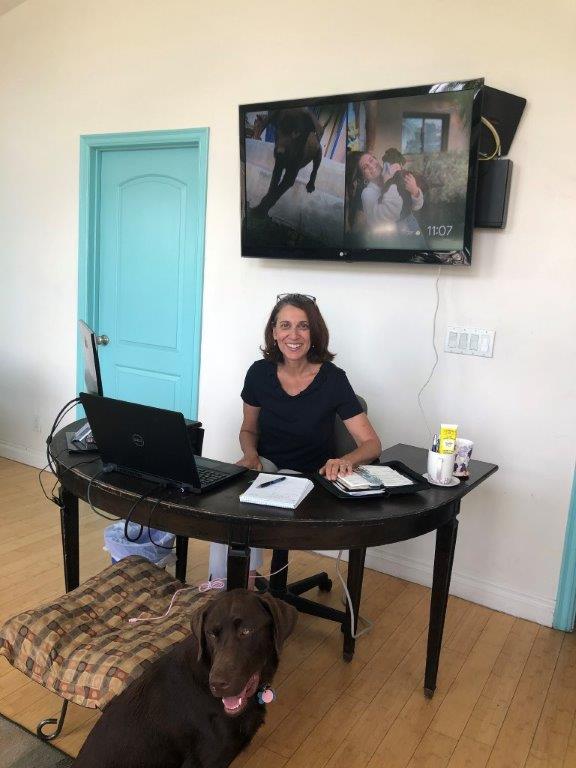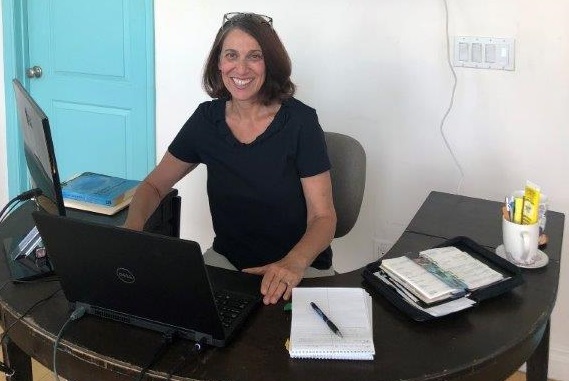LAFLA Senior Attorney Paula Cohen has spent more than 25 years of her life assisting some of LAFLA’s most vulnerable clients – those suffering abuse and violence at home, yet without the financial resources to move safely elsewhere. Paula’s entire career has focused on working with domestic violence victims, helping them to secure safety, stable child custody orders, and appropriate child support orders. Over the course of her LAFLA career, Paula has helped thousands of clients secure restraining orders, custody orders, and judgments of paternity and divorce.
Until the Safer at Home orders universally changed daily life, Paula divided her time between LAFLA’s Long Beach office and our Long Beach courthouse-based Domestic Violence Clinic. On March 16, 2020, Paula hurriedly prepared two restraining orders at the DV Clinic for desperate clients before both the courthouse and the LAFLA offices shut down. Since then, like so many others around the globe, Paula’s home has also become her workplace.
“I’m one of those few people who didn’t even have a computer at home,” said Paula. “My phone was my computer. The good thing about that was I had great work-home boundaries. When I left the office, I largely left work behind me and was able to focus appropriately on my family’s needs once I got home.” Paula has a husband and five children so work-home balance has always been critically important to her.
Creating a home office space took some time. Paula now uses one of LAFLA’s laptops at home. “At first, I was working on a low, children’s table because I didn’t even have a desk! Since working from home, I’ve taken long walks every evening because I really need the fresh air and exercise at the end of my workday. On one of these walks, I stumbled across a neighbor selling an old desk. It was just $40 and is perfect for my needs!” Now Paula has set up her desk with two screens. Paula interviews clients over the phone and continues to do what she has been doing for decades – advising clients, preparing pleadings, and representing clients in domestic violence and family law matters.
 LAFLA has transitioned its domestic violence clinic services to a virtual operation with intake screeners, paralegals, and attorneys each working from their own home.
LAFLA has transitioned its domestic violence clinic services to a virtual operation with intake screeners, paralegals, and attorneys each working from their own home.
“Instead of meeting the client in person, we communicate by phone and prepare the pleadings based on our conversation. If we need supporting documents such as police reports, text messages, or photographs, we ask the client to email these things to us to attach to their pleadings,” said Paula. “It’s more difficult to gain the client’s trust without sitting together in a confidential setting. When we meet in person, it feels natural to comfort the client; our sessions together can be intense and often include tears and hugs. Over the phone, we need to allow time for that trust to grow. We also must be sure that the client is safe and able to talk freely. This is particularly hard now that children are at home all day – we never want children to overhear our interviews. And we may need to take breaks for the client to attend to family members’ needs. This all takes time and patience. For me, the hardest thing about working over the phone with a client is that loss of deep personal connection. But, by the end of our process, the client is still able to obtain the protections and court orders needed for safety and stability, and that is a prize well worth the extra effort involved.”
While the courts are prioritizing emergency cases such as DV restraining orders, it is continuing most other family law matters. Paula has an active caseload of clients with pending family law hearings, now postponed for months.
“I’ve spent lots of time patiently discussing COVID-appropriate co-parenting with clients. The courts don’t have the capacity to hear ‘ordinary’ custody disputes at this time, so we have to help clients to create interim parenting agreements that provide safety for all involved, while permitting both parents to have frequent and continuous contact with their children,” noted Paula. “This may mean lots of phone and video time when the distances or health risks are too great. We encourage clients to send frequent text messages and photographs of the children, and to keep the other parent informed regarding online school progress and health updates. When life returns to some-kind-of-normal, the courts will not look kindly on parents who used the virus as an opportunity to keep children from having regular contact with both parents. Of course, health and safety are paramount, but separated parents must make every effort to be available for their children, to support and guide them, and to help them through this very confusing time in their young lives.”
We at LAFLA have a responsibility to guide many hundreds of families through this pandemic. Our clients are extremely vulnerable; they look to us for support and guidance. We continue to offer essential services from our own homes, even while our own families adjust to and navigate Safer at Home orders and restrictions. Paula added, “This has certainly been a huge adjustment for me – but now I know that I can help clients from anywhere, and that’s been a really important lesson for me to learn.”
If you need legal assistance, please call LAFLA at 800-399-4529 or apply online for our free services. Additionally, our courthouse-based domestic violence clinics are providing assistance with restraining orders on Mondays, Wednesdays, and Fridays from 9 a.m.–12 p.m. and 1–3 p.m. Call 800-399-4529 extension 8097 for help.
P.S. Paula gives a quick tour of her home office in the video below. We’re so grateful to Paula for sharing how she continues to serve vulnerable clients during the pandemic – and for welcoming us into her home.



